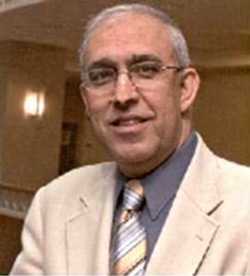IEEE SMC Technical Committee on Systems Safety & Security &
University of East London (UEL)
Friday 10 July 2009, 15:00, EBG18, Docklands Campus
Control of System of Systems

Mo Jamshidi
Lutcher Brown Endowed Chaired Professor
The University of Texas, San Antonio, Texas, USA
ABSTRACT
Systems engineering is at a crossroad now at the beginning of the 21 Century. One of the main challenges of any paradigms in systems engineering is being able to handle complex systems under unforeseen uncertainties. A system may be called complex if its dimension (order) is too high and its model (if available) is nonlinear, interconnected, and information on the system is uncertain such that classical techniques cannot easily handle the problem. A system of systems (SoS) is a “super system,” or an integration of complex systems coordinated together in such a way to achieve a wider goal with possible higher significance. Applications of SoS are quite extensive – examples are future combat mission, Global Warming, Mars missions, Air Traffic System, Global Earth Observation System, Electric Power Grid System, Energy systems, etc. In system of systems engineering, almost all aspects of system engineering need to be revisited. Two aspects are sensing and control. From the control problem point of view, the difficulty arises that each system’s control strategy can not depend solely on its own on-board sensory information, but also due to communication links among all the neighboring systems or between sensor, controllers and actuators. The main challenge in design of a controller for SoS’s is the difficulty or impossibility of developing a comprehensive SoS model, either analytically or through simulation, by and large, SoS control remains an open problem and is, of course, different for each application domain. Should a mathematical model be available; some control paradigms are available which will be the focus of this chapter. Moreover, real-time control – which is required in almost all application domains – of interdependent systems poses an especially difficult problem. Nevertheless, several potential control paradigms are briefly considered in this chapter. These control paradigms are hierarchical, decentralized, consensus-based, cooperative and networked. In this presentation system of systems are being introduced, challenges are brought up and potential solutions and needs are discussed. Special emphasis on UTSA ACE Center’s SoS technology will be demonstrated. Some Animated and experimental implementation as well as media movies and clips will be shown.
ABOUT THE SPEAKER:
Mo M. Jamshidi (Fellow-IEEE, Fellow–ASME, Associate Fellow AIAA, Fellow–AAAS, Fellow-NYAS, Fellow-TWAS (Academy of sciences for developing nations)) received the B.S. degree in electrical engineering from Oregon State University, Corvallis, Oregon in June 1967, M.S. and Ph.D. degrees in electrical engineering from the University of Illinois at Urbana-Champaign in June 1969 and February 1971, respectively. He holds 3 honorary doctorate degrees from Azerbaijan National University, Baku Azerbaijan, 1999, University of Waterloo, Canada and Technical University of Crete, Greece, 2004. Currently, he is the Lutcher Brown Endowed Chaired professor at the University of Texas System at San Antonio Campus, San Antonio, TX, USA. He is the Director of the ICSoS – International Consortium on System of Systems Engineering (icsos.org) since 2006. In 1999, he was a NATO Distinguished Professor in Portugal of intelligent systems and control. He has been an advisor with NASA (10 years), US AFRL (9 years) and DOE (6 years) 1984-2006. He has nearly 600 technical publications including 63 books and edited volumes. Six of his books have been translated into at least one foreign language. He is the Founding Editor or co-founding editor or Editor-in-Chief of 5 journals. He is editor-in-chief of the new IEEE Systems Journal (inaugurated in 2007) and founding editor-in-chief of the IEEE Control Systems Magazine. He is the founding General Chairman of World Automation Congress (WAC), (wacong.org) since 1994. Dr. Jamshidi is a fellow, associate fellow or member of 8 professional societies and academies around the world. He is a recipient of the IEEE Centennial Medal and IEEE CSS Distinguished Member Award. In 2005 he was awarded the IEEE Norbert Weiner Research Achievement Award. In 2009 he received the United Kingdom Royal Academy of Engineering Fellowship to lecture at several British Institutions.
Submitted by:
Ali Hessami
Chair, UK&RI Chapter


